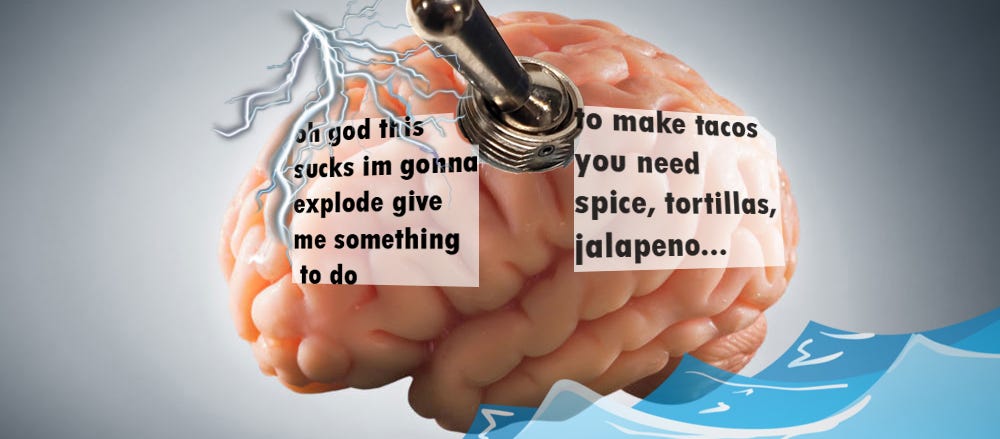Boredom as Broccoli
You won't ever crave it, but if you want to be healthy it can't be avoided.
Note: I am not a neurologist. The statements made here about the brain are imperfect metaphors used to describe the experience of brain ownership, not physical brain function.
Boredom is the dream bird that hatches the egg of experience. A rustling in the leaves drives him away. —Walter Benjamin
There’s a switch that flips in your brain about three to five minutes into being bored. You know the uncomfortable feeling when you’re sitting there waiting for someone? It sets in immediately, almost like an itch. You’ll look around the room or shift in your seat, play with the tufting on the chair. But eventually, maybe a minute in, or maybe after only a few seconds, the feeling intensifies to the point where you’ll usually (perhaps not even consciously) take out your phone to ease the tension. But imagine this time for some reason you don’t have your phone. You’re forced to just… sit with the feeling. It builds and builds and it feels like it’s going to keep on intensifying. Then, suddenly… it’s gone. And you’re not sure it was ever there.
To imply that the feeling simply “goes away” like an itch that magically didn’t need scratching is perhaps not the right language. It never feels like a weight is lifted. It’s more like a realization that the thing you thought was bothering you was never there in the first place.
One minute you’ll be sitting there antsy, the next thing you know, ten minutes have passed and you’re thinking about what to make for dinner, or making plans for the weekend. Maybe you’ll find yourself thinking about an artistic project like a book you want to write, etc. Unless you pause to reflect on the moment you probably won’t even have realized that the itchy, intense feeling of boredom went away.
It’s kind of like those restless nights in bed where you think surely you’re never going fall asleep and suddenly it’s eight A.M. and you have no idea what you did to get here (if you even happen to pause and reflect on it at all).
But therein lies the trick- to get to this liminal mental space somewhere between focused and asleep, where organizing, planning and creativity are the default (and where most of humanity spent their time until recently) you have to do, well, nothing. When your brain realizes that there’s nothing in the immediate surroundings that will stimulate it, and the situation doesn’t appear to be changing soon, it will flip a switch and find or make up something to entertain it.
That process of finding is when you are at your most creative. And “creativity” doesn’t only mean “works of art” or “big problem solving”; it is quite literally “considering possible situations that might arise in the future”, so that when they do arise, the brain already has a plan. Many productive artists know this and actively try to induce a state of boredom. But it’s helpful for anyone to spend time here so that the coming events of the future don’t seem to come shooting in from all directions.
When you are always that little bit more prepared for the future, the world will not feel like it is coming at you so fast, because you’ll be ready for it. Or at least ready for its possibilities. This is usually described as feeling “centered” or “grounded”. Getting there is not exactly a conscious process, either. For example, while waiting for the bus you may boredly muse about how much you enjoy tacos. Later, when it comes time to shop for dinner, you may find yourself automatically going to the Mexican food aisle. You skipped that mildly-laborious mental first step of deciding “What do I want?” because you -rather, a quieter and less laser-focused part of your mind- already handled it earlier.
Think of it as handing off your non-urgent tasks to your subconscious mind for it to do “in the background” throughout your day. But in order to make that hand-off, the subconscious mind must be allowed to come to the surface, take a look at the situation, and see how it can help before going back to the background to chew on it a while. An ever-present distraction (like an attention-hijacking app in your pocket) interrupts that process and prevents that lower-conscious assessment.

Our brains didn’t evolve in an environment of constant stimulation, so the brain learned to use its “downtime” constructively. When there was nothing pressing to hold its focused attention, it evolved to put some lower probability tasks on the back-burner where they can slowly cook. The conscious (“focused”) part of your mind can always take back the wheel if it needs to, because well, anyone who couldn’t be shaken out of a daydream during a tiger attack probably didn’t live to propagate their genes.
Our digital (and mental) environment now is one where we are always on alert for tigers that don’t exist, and it’s preventing our subconscious from slowly mulling over what to get Mom for Christmas before it’s too late. It’s like eating a purely high-sugar diet. You’ll never not crave sugar. After the fifth cookie you probably won’t be any more satisfied than after cookie number two. But at the same time you could probably totally find room for cookie number six. On the other hand, you’ll never crave the broccoli, but if you don’t eat it you’re gonna have a bad time.
Does the world feel like it’s spiraling out of control? Indeed- there are absolutely major issues that need addressing, but also, haven’t there always been? Have you ever stopped to consider that it might be your perception of events that is doing most of the spiraling? Ask yourself: What good are you to the world if you’re always at capacity?
Next time you find yourself bored and reaching for your phone, try to remind yourself that this feeling won’t intensify forever. It will go away in less time than the average YouTube video. And if you find still find yourself mentally adrift in a stormy sea, unable to resist the urge, remember: nobody’s forcing you to be there.






Amazing article! This hit the nail straight on the head. I'll be returning to this article to remember this more often.
This is probably the hardest part. As someone with ADHD, boredom is physically and mentally *painful*. Because we have a dopamine deficiency, any lack of stimulation is making it so our brain goes crazy seeking something stimulating just to be at a normal level. I've found stim toys or anything to do with your hands helps the ability to "be bored" and let your mind drift without being in pain. I've taken up crocheting.
The other issue is "letting the subconscious handle it"-- memory issues and executive dysfunction issues mean my brain isn't reliable for holding things there. I end up trying to keep a small notebook on hand whenever im "zoning out" as described in this article so I can write any passing thoughts.
All these issues are why phones are so addictive for ADHD folks especially. And why it's important to find stimulation elsewhere. I'd also highly recommend meditation as an intermediary step of "eating your broccoli" -- something about dedicating small increments of time to meditating and going unfocused feels better than just trying to do it by randomly zoning out.